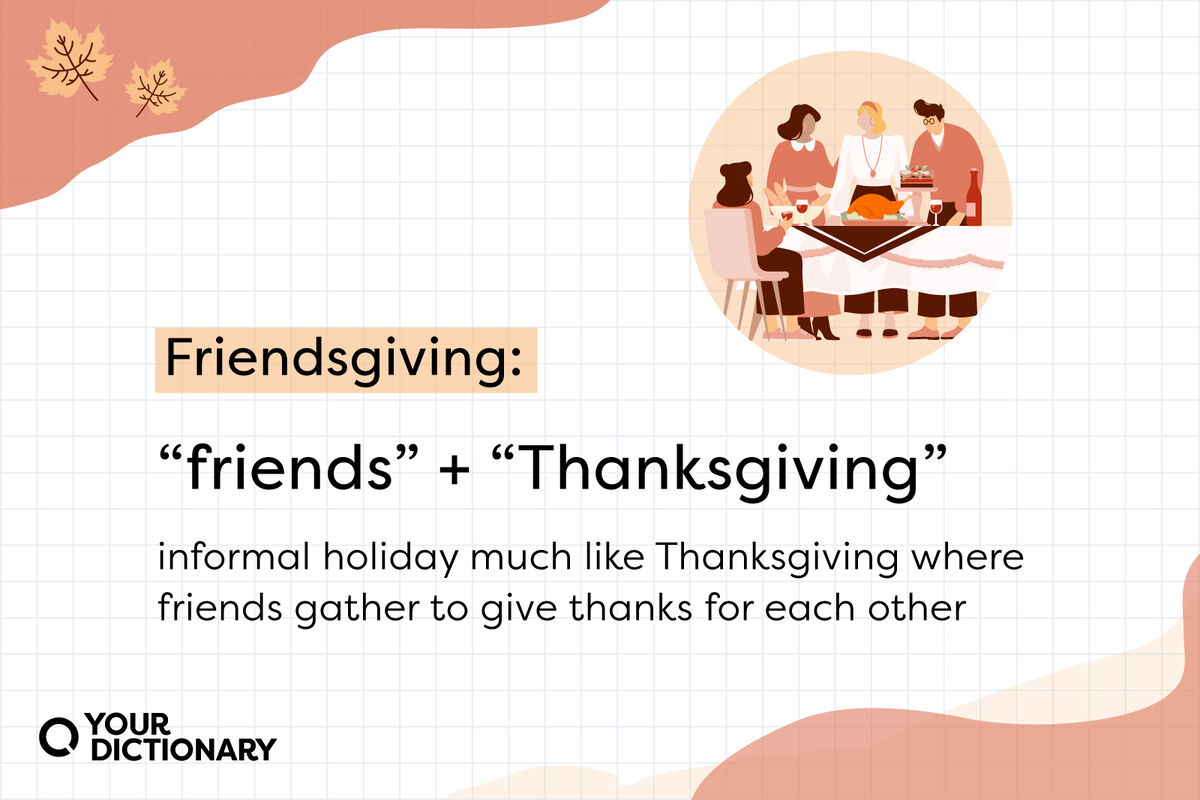
Thanksgiving is one of those beautiful holidays where the food really is the star of the show. Turkey, gravy, stuffing, mashed potatoes, Brussels sprouts, pies of various fillings and formations. Friendsgiving takes all that and asks, “What if you had some lovely friends to help you eat all that food?”
What Does "Friendsgiving" Mean?
Much like Galentine’s Day, Friendsgiving is a bit of an informal holiday. The word Friendsgiving can be weird to look at if you’re comparing it to Thanksgiving. If Thanksgiving is about giving thanks, is Friendsgiving about giving friends?
In reality, Friendsgiving is a combination of friends (y’know, those people you share all those inside jokes with) and Thanksgiving. Friendsgiving is simply the same as Thanksgiving, but with your friends instead of family. This makes it a portmanteau holiday on par with Movember and Chrismukkah.
Friendsgiving can act as a replacement for Thanksgiving, but it can also be in addition to Thanksgiving. For example, some people might have a Friendsgiving get-together the weekend before Thanksgiving Day, followed by a traditional family dinner celebration the day of Thanksgiving.
The Origin of Friendsgiving
While it might not be new in concept, Friendsgiving is a fairly recent word in the English language. There’s no exact record of when it entered the cultural hivemind. While many people assume it came from popular TV sitcom Friends, not a Ross, Chandler, or Phoebe ever mentions Friendsgiving.
- Friendsgiving appears in print as far back as 2008 in the Pensacola News Journal.
- McSweeney’s published a tongue-in-cheek piece called “The First Friendsgiving” by Chris Brotzman, who also attributes 2008 as the year of the first Friendsgiving.
- 2011 was a banner year for Friendsgiving with the help of two holiday favorites: Bailey’s Irish Cream and The Real Housewives of New Jersey. Bailey's Irish Cream mentioned Friendsgiving in an ad campaign in 2011.
- The Housewives held their own Friendsgiving celebration in a 2011 episode titled “Gobblefellas.”
In terms of search, a handful of people were looking up Friendsgiving as far back as 2004, but the holiday reached its peak search volume around November 2019.
How To Use “Friendsgiving”
Even though Friendsgiving is a bit of an informal holiday, you should still capitalize the “F” when you write it down (like you would for Festivus, another informal holiday). Friendsgiving Day isn’t a particularly common phrase, considering there isn’t an official day for Friendsgiving.
Otherwise, using Friendsgiving is pretty straightforward.
- Everyone agreed to bring some food to our Friendsgiving celebration.
- The Friendsgiving dinner was free of all the drama that he was used to with his family on Thanksgiving.
When Is Friendsgiving?
Considering it’s not an official holiday, there aren’t any real rules about when to hold your Friendsgiving celebration. Playing things fast and loose is part of the spirit of the holiday, really.
For those not using it as a replacement for Thanksgiving, Friendsgiving typically lands anywhere from the weekend before Thanksgiving to the weekend after Thanksgiving.
What Does “Thanksgiving” Mean?
In the United States, Thanksgiving is a holiday celebrated in the fourth week of November every year. The word itself is a simple joining of thanks and giving. While you might know Thanksgiving primarily as a reference to Thanksgiving Day, the word also exists in a lowercase form (thanksgiving) as a noun that means “the act of giving thanks or expressing gratitude.”
The Origin of Thanksgiving
In November 1621, after treacherous journeys and brutal winters, the Pilgrims celebrated their first successful corn harvest with a feast. They invited the Natives who helped them survive, and the merriment lasted three whole days.
- That feast is considered the first Thanksgiving, but the actual phrase Thanksgiving Day apparently wasn’t used until the 1670s. Even then, the holiday was celebrated sporadically.
- We have good old Honest Abe himself to thank for making the last Thursday in November “a day of Thanksgiving” in 1863.
- In 1870, Congress officially passed legislation making Thanksgiving a national holiday.
- The problem here: Unlike other national holidays, Congress didn’t dictate an official date for Thanksgiving. Most presidents followed Lincoln’s lead and made Turkey Day the last day of November.
- President Franklin D. Roosevelt pulled Thanksgiving back a week, making it the third Thursday of November as a way to extend the Christmas shopping period to fend off the ongoing effects of the Great Depression.
- In 1941, the House passed a bill that President Roosevelt signed into law that officially made Thanksgiving the last Thursday of November.
How To Use “Thanksgiving”
When you’re talking about Turkey Day proper, you can say Thanksgiving or Thanksgiving Day. Make sure you capitalize the first letter because you’re talking about an official holiday.
- This Thanksgiving, my brother challenged himself to eat as many slices of pie as possible.
- My favorite part of Thanksgiving is the leftovers.
- Our Thanksgiving Day celebrations always start with praying for a win for our football team.
- I love the Garfield float in the Macy’s Thanksgiving Day Parade almost as much as he loves lasagna.
The lowercase thanksgiving is more often used in religious contexts. Despite the -ing ending, thanksgiving isn’t generally used as a verb.
- On Thanksgiving, let’s take time to offer some thanksgiving to all of our guests.
- My grandmother liked to show some thanksgiving all year round to show that she truly loved and appreciated us.